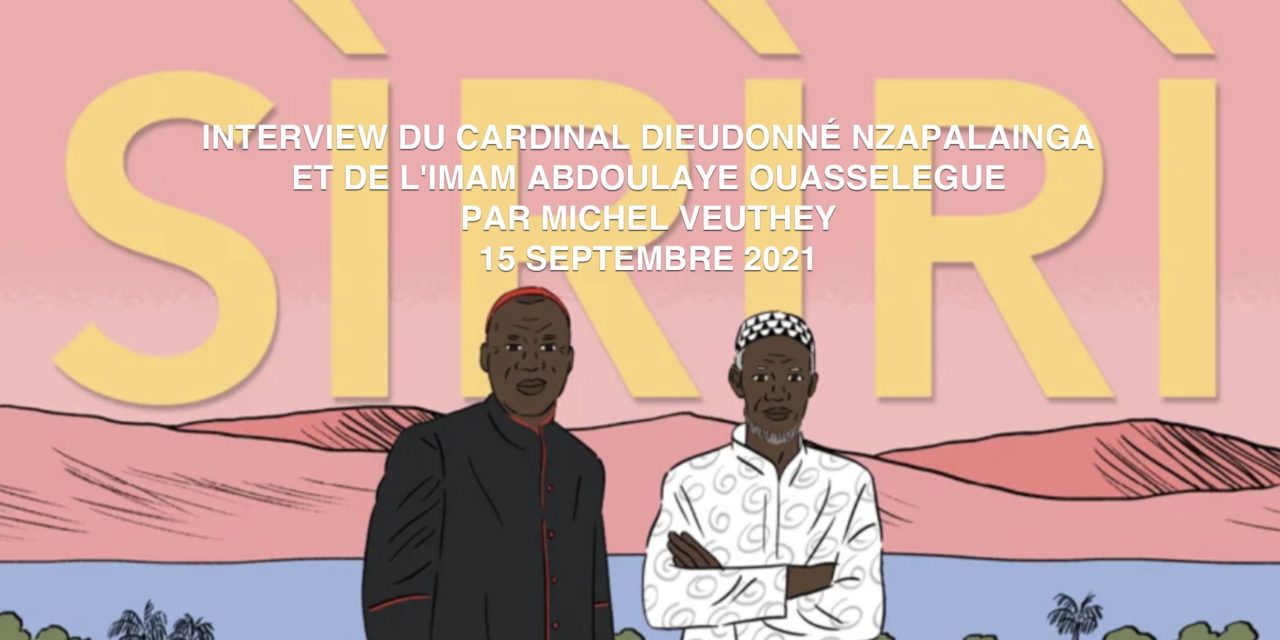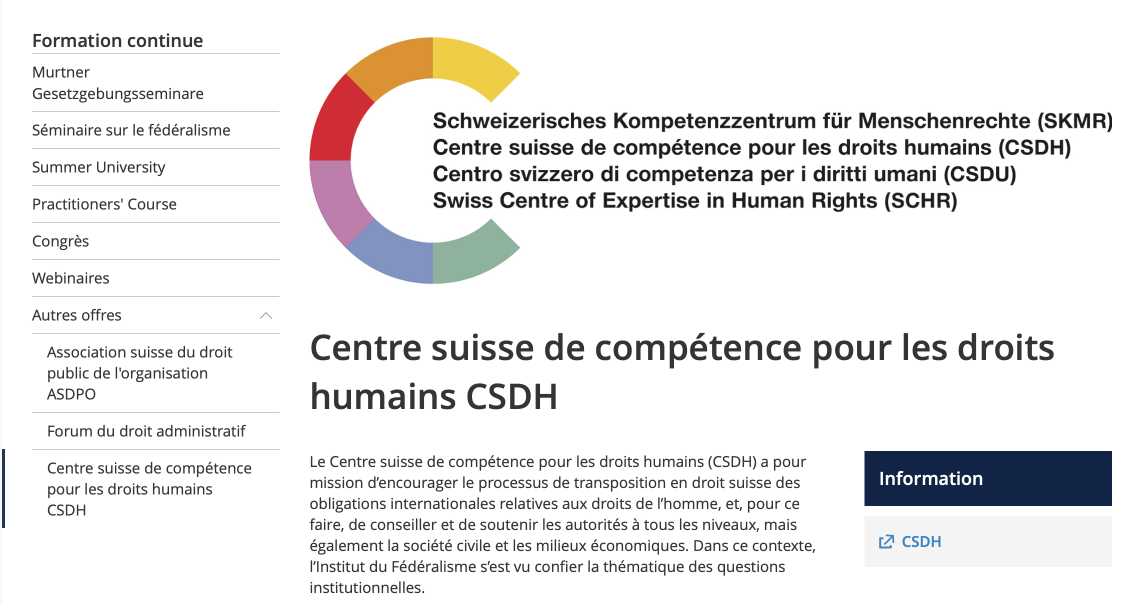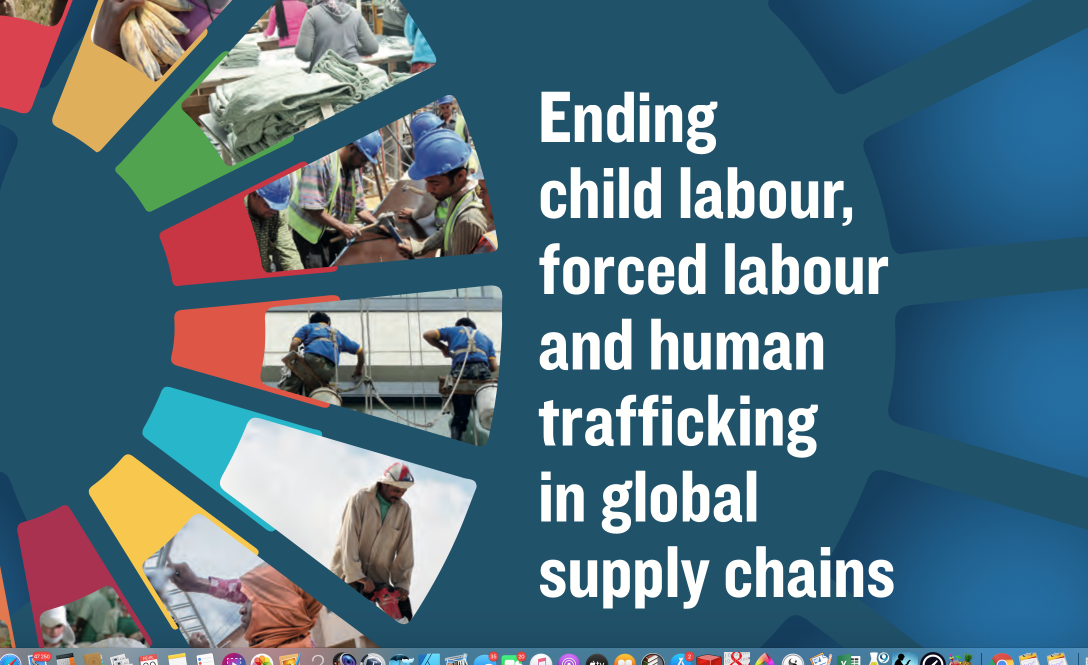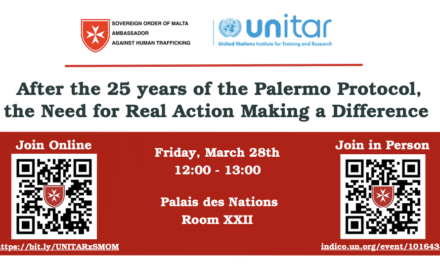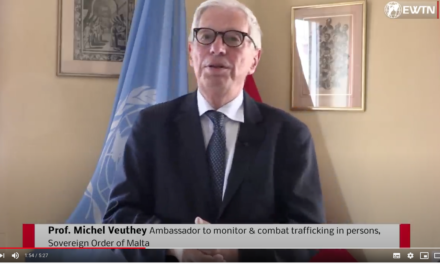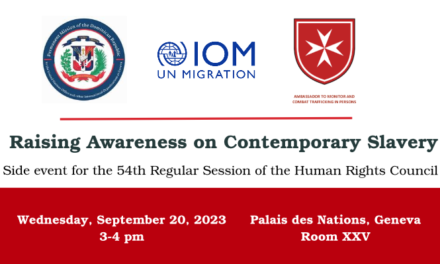Depuis 2013, la République Centrafricaine s’enlise dans un conflit qui opposent groupes armés chrétiens et musulmans. Pendant que les diamants et l’or sont commercialisés dans l’indifférence globale, un cardinal et un imam luttent ensemble pour la coexistence interreligieuse car, pour eux, cette guerre n’a rien à voir avec la religion.
Le Cardinal Dieudonné Nzapalainga et l’Imam Abdoulaye Ouasselegue étaient à Genève (Suisse) pour la présentation du lancement du film “SIRIRI Le Cardinal et l’Imam” : https://www.outside-thebox.ch/siriri/ — depuis 2013, les rebelles instrumentalisent la religion et poussent chrétiens et musulmans à s’entretuer. Des chefs de guerre contrôlent la quasi-totalité du territoire et ses ressources. à travers la brousse ou la forêt, avec son équipe, le cardinal remonte les pistes au volant de son 4×4, traverse des rivières et des barrages. Sans aucune discrimination confessionnelle, il écoute le peuple et recueille les témoignages. Il réconforte les cœurs brisés, tente d’apaiser la colère et de ramener à la raison les hommes en armes. Inlassablement et d’une même voix avec l’imam Kobine Lamaya, le cardinal implore le peuple à ne pas tomber dans le piège habituel, à ne pas succomber à l’usure de ce scenario répétitif. Leurs seules armes sont la foi, le bon sens et un message fort: « Nous sommes tous frères et sœurs, tous Centrafricains. » À l’image de son mentor le pape François, le cardinal n’hésite pas non plus à demander que justice soit faite, que les autorités et la communauté internationale prennent leurs responsabilités et se demandent aussi à qui profite ce conflit. Qui vend les armes aux rebelles, qui achète l’or et les diamants et où partent-ils ? Ce film se veut une parabole exacerbée des problématiques contemporaines : le partage des richesses, le pouvoir des armes, le détournement des paroles saintes et la mise à l’écart continue des périphéries du monde. Porté par deux hommes résolus, ce film interroge l’ordre du monde, le vivre ensemble et les balises qui résonnent en chacun de nous. Au-delà du témoignage historique sur une tragédie oubliée, le réalisateur de Sìrìrì voit son film comme un film d’aventures poignant, une célébration fraternelle, un film qui soit une inspiration pour chacun de nous. L’Imam Oumar Kobiné Layama qui a créé avec le Cardinal Dieudonné la plateforme des religions et des confession de la Rébpublique Centrafricaine est décédé fin 2020 et a été remplacé à la tête de la plateforme par l’Imam Abdoulaye Ouasselegue dans ce combat pour la dignité et la paix du peuple centrafricain.
INTERVIEW OF CARDINAL DIEUDONNÉ NZAPALAINGA AND IMAM ABDOULAYE OUASSELEGUE BY MICHEL VEUTHEY ( 15 SEPTEMBER 2021)
MICHEL VEUTHEY: Eminence, Excellency, thank you for coming to Geneva to bring this message of dialogue and fraternity that the Platform of Religions and denominations in the Central African Republic is trying to spread thanks to the efforts of both of you. Today, I’d like to ask you the question: what does this Platform do? What are the different faiths doing in the Central African Republic against human trafficking?
CARDINAL NZAPALAINGA: Thank you for giving us the floor. The Platform of Religious Denominations was founded in the midst of a crisis. This means that ordinary Central Africans were humiliated, mistreated and not considered. The children were enrolled in the groups. Many women were raped. Human rights were no longer respected. We stood up as fathers, because the man in charge of the platform, is a shepherd, he must take care of his sheep, and we stood up and said, “No, we can’t keep killing, raping, destroying, mortgaging our children’s future.” Why did we get up? To go and meet those who have taken up arms and tell them: this child you enlisted, who is innocent, admittedly enthusiastic. That’s why they’re cannon fodder. You, you have the future. Sometimes we ask questions to people and tell them, the leaders: “Do you have your son in the group?” In general, they say no to me, they don’t have their son. “You don’t have your son, so why is another’s son in this group? Is your wife in the group? No. ” If what has been done, you’re doing to this woman, raping her, if we did it to your wife, would you be happy? No. We are here to raise awareness, to say that there are things we cannot tolerate. There are things that destroy us. There are things, really, that humiliate us and which show that the human being has lost his value. We must have the courage of truth, to go to those who only have weapons to talk to them and that’s one of the roles, one of the missions that the Platform not only tells in the distance to journalists, but to go in front of the executioners, in front of those who have only weapons to tell them. The role also, the mission of the Platform, is to question the government, because in a country, a government is responsible for protecting the population. When we see that dignity is threatened, in our motto, there is : Unity, Dignity, Work, dignity is threatened. Government, what are you doing? People are crying, since we become spokespersons of these people who are in the villages and do not see the political authority, the administrative authority, the judicial authority coming and meet them. Take responsibility. That is also our role. In a country as fragile as ours, which is emerging from a crisis that is still ongoing, there is the international community that is present, this community through the Blue Helmets, through the civilians working or humanitarians, we say you can also make a contribution to help so that this woman who has been raped, can be treated in a reasonable amount of time, to avoid negative consequences. You can also give your contribution, Unicef so that the child is not always in this group enrolled, and we can integrate him so that he can look for a job later on to work. You can also make a contribution if you can give an alternative to these people who took up arms, so we can leave the population to go about their business freely, not to take the population hostage. You see here some examples of the commitment, the mission also of the Platform, and of each religion, that we carry out to those you have called, who are suffering or who are still considered to be victims of trafficking, which are abandoned and we come to their rescue to make pleas and that we are here to hold their hands, to console them, to encourage them, to direct their complaints, their grievances in the right direction.
MICHEL VEUTHEY: Thank you, Eminence. And you, Excellency, what can you tell us about this?
IMAM ABDOULAYE OUASSELEGUE: You know that this is a very worrying subject for us religious, because our fight is to give every living being its dignity, it’s in the Holy Scriptures, and therefore our work at the level of the Platform, but also in the congregations, we rely much more on on the words. We don’t have a prison, we don’t have a law enforcement agency. Our repressive force, is the scriptures. These scriptures contrast with the methods of barbarism, the methods of humiliation and the methods that deprive the person of his or her rights. That is why we preach through our lectures, our homilies, our preaching. We call on everyone to respect the right of women. The woman is a creature that I would describe as precious for the future of the entire universe, for the future of society. For us, we are basing this on the fact that the woman is the first educator of the offspring because it is she who gives the first care, so she deserves respect, she deserves that value, that honor. So for us, it is out of the question to make her suffer dishonor. That’s why I base myself on the teachings of Islam. That’s why it’s forbidden, even for a man, to have a relationship outside of marriage with a woman. If it’s already forbidden to have a relationship outside of marriage with a woman, what does this mean? This means that you would first have to meet certain criteria, certain steps to be able to be in communion with a woman and pretend to share the same hope, the same future with this woman. She becomes one body with you and you form a household. If you’re going to have children, you have to educate those children. It’s quite a process for us to protect a woman. So, in the end, we are in a State. The State is organized. For us, most of the time, if there are things, we denounce publicly. We raise our voices. We talk, we index, but it is up to the State to take its responsibilities to be able to get their hands on the gravediggers, those who violate women, those who humiliate women. The State must get its hands on based on information, credible information. That’s what we do every day. This is to reassure you that we, as religious entities, you raise for us a subject that concerns us on a daily basis, this is our daily work, the protection of women and children.
MICHEL VEUTHEY: Thank you very much. Perhaps you would like to add a word, what does, for example, parishes or local groups do to reintegrate people who have been trafficked, whether they are children who are demobilized from armed groups, or women that we manage to get out of prostitution, whether they were adults who worked in mines or in agriculture and that we manage to reintegrate into their group, that we manage to get, I would say, on their feet, and out of slavery?
CARDINAL NZAPALAINGA: As you ask the question directly, I will answer you directly as well, the Catholic Church. I take the case of women who have been raped and sometimes have lost their honor in some places and where sometimes men reject them. We have a place, we built a house to say, the kind of people who are not well regarded elsewhere, we’ll take them in. Well done. They will cultivate the field. They’re going to redo the plan of their lives and maybe they can still leave to find the path of hope. At first, it’s nothing. There are a few people there, but that’s the point. We are looking to build a center for these young people. We already have the Salesians of Don Bosco who work with young people. They take care of young people who are in these difficult situations and they give them the chance, often to learn a trade, and be able to insert them, to be able to launch a new future, so I think that’s important too. We have women, a group called the “Christian Women”, who spot other women who are rejected. We’re working to integrate them because it’s not easy, when you have been raped, pointed out et cetera, well, there would have to be some who would defend you and who are like intermediaries to help you find your place and that you are a victim. You are not an executioner, so we don’t add evil to evil again to exclude you from society. So there’s this work that’s being done too and other. We ask each and every one to be attentive. There is the Justice Commission, that is true, the Justice and Peace Commission which is attentive in the neighbourhood to see if there are any such situations with the prostitutes, situations with perhaps other people, to see how to restore justice. How can we make sure that peace returns in society, in the hearts of some and also in the community. That is the role, these are some of the steps that we do at the parish level or even at the level of certain groups, at the level of certain congregations, which has as its vocation to commit itself to help children. That’s what I can tell you.
MICHEL VEUTHEY: Thank you. Very interesting. Would you like to add anything?
IMAM ABDOULAYE OUASSELEGUE: Just a little bit at the level of the Platform. The Platform, today, is structured. There is a Youth Committee that deals with the concern of youth. There is also an office that deals with women’s affairs. In this office… Everything that concerns women, sometimes it becomes a taboo. We can’t talk about this with just anyone. Now, women among themselves, it’s easier to deal with the issues that concern them. That’s why there’s an office there that deals with these issues. Women abused, raped or who have suffered dishonour are sometimes identified, listed. There is an approach that is sometimes taken to come to their rescue. I would go even further, to help them gain access to justice. Very good. There are already mechanisms in place. This is at the level of the Platform of religious denominations, of which we are the representatives. At the denominational level, as the Cardinal said, at the level of the Supreme Islamic Council, we have an office called National Office of Muslim Women. In this office, there is a committee that takes care of orphans, widows and abused women. It’s very hierarchical and the subject is dealt with at that level. We can’t afford to put in the public arena the problems that concern this dishonoured class of people. But we are aware of this situation. This is why mechanisms are put in place to deal with the issue.
MICHEL VEUTHEY: Very well. Thank you very much. I know you are expected, so I would like to not only thank you but really wish you success in all that you do, and also that the message that you have tried to carry in the film “Siriri, the Cardinal and the Imam” is really well understood and that your work on behalf of victims of trafficking, to prevent trafficking, to fight it, to rehabilitate all these victims can continue. In any case, thank you. Best wishes. I hope we stay in touch and that we can support your action. Thank you.
L’Imam Oumar Kobiné Layama

